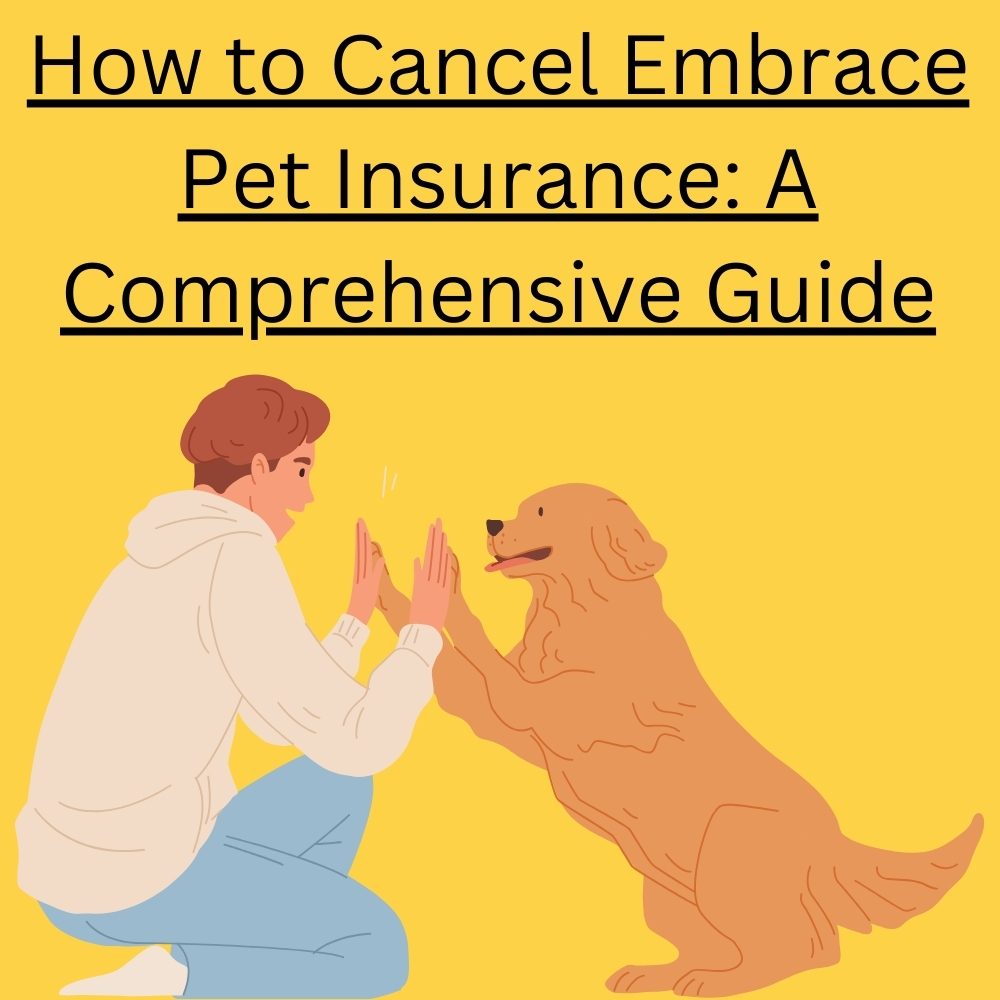Financial support for veterinary care costs is provided by pet insurance, which serves as a vital safety net for pet owners. Euthanasia is a compassionate end-of-life option, but many pet owners are unsure if their insurance policies cover this difficult decision. The question of whether pet insurance pays for euthanasia will be discussed in this article along with tips on what to look for in a pet insurance provider, various policy options, and alternatives to pay for the expenses of euthanasia.
What is Pet Insurance?
The purpose of pet insurance is to assist pet owners in covering the expenses associated with veterinary care. In general, pet insurance has monthly premiums, deductibles, and coverage limits, just like human health insurance. Preventive care, sickness, and accidents are just a few of the costs that these policies may cover.
Is Pet Euthanasia Covered by Pet Insurance?
Pet insurance policies differ in what they cover when it comes to euthanasia. Euthanasia is approved for humane reasons and is covered by the policy if the euthanasia-causing condition is, according to some insurance providers. When euthanasia occurs due to a covered condition and for compassionate reasons, for instance, Embrace Pet Insurance will pay for it under its accident-and-illness policy[^1]. It is noteworthy, nevertheless, that euthanasia coverage is not a feature of every pet insurance policy.
Factors to Consider When Choosing Pet Insurance
Considerations for choosing pet insurance include the following:
- Monthly Premiums: The amount that you will have to pay each month for your insurance.
- The amount you must pay out-of-pocket each year before your insurance coverage begins is known as your annual deductible.
- Coverage Limits: The highest sum that the insurance company will cover for veterinary costs.
- The portion of the vet bill that you must pay after the deductible is met is known as the co-payment percentage.
- Waiting Periods: How long will it take for certain conditions or treatments to be covered?
- Pre-existing Conditions: Eligibility for coverage of pre-existing conditions under the policy.
Taking these things into account will assist you in selecting a pet insurance plan that fits both your spending limit and your pet’s individual requirements.
Different Types of Pet Insurance Policies
There are several types of pet insurance policies to meet different needs:
- Policies that only pay for accidents: These policies pay for costs associated with mishaps, like injuries sustained in auto accidents or falls.
- Policies for Accidents and Illnesses: These types of policies cover a variety of illnesses and accidents, including long-term ailments like cancer or diabetes.
- Policies with optional coverage let pet owners customize the policy to meet their pet’s needs by selecting from a variety of coverage options.
- All-inclusive Plans: These plans provide extensive coverage for illnesses, accidents, and preventative care.
Choosing the right kind of policy for your pet will guarantee that you have enough coverage, including euthanasia coverage if that’s what you’d like.
Understanding Pet Insurance Coverage for Euthanasia
If euthanasia is covered by your pet insurance policy, it’s important to know how much is covered. While some policies may only cover euthanasia in cases where it is determined to be medically necessary, others may do so as part of standard wellness care. Euthanasia-related extra expenses, such as cremation or burial, might not be covered, though. You can ascertain what is and is not covered by carefully going over the details of the policy.
Alternatives to Pet Insurance for Covering Euthanasia Costs
There are other choices available if the costs of euthanasia are not fully covered by your pet insurance policy:
- Payment Plans: A lot of veterinary clinics let you spread out the expense of euthanasia over time with their payment plans.
- Financial Assistance: Grants or financial aid may be available from charitable organizations and crowdsourcing websites to assist with veterinary bills, including the cost of euthanasia.
- Personal Savings: When necessary, euthanasia expenses can be covered by setting aside money expressly for pet care.
- Memorial Funds: You can get money to cover the costs of euthanasia and associated expenses by setting up a memorial fund or asking friends and family for support.
Pet Life Insurance: A Different Approach
Some providers offer pet life insurance in addition to standard pet insurance. In the unfortunate event of your pet’s demise, these policies may offer financial support, including payment for the expense of euthanasia. To find the best option for your needs, it’s critical to investigate and contrast various pet life insurance plans.
Top Pet Insurance Providers
Pets are fully covered by a number of reliable pet insurance companies. Trenchant, Fetch, LV, and Spot are a few well-liked choices[^1]. Even though the context for these providers is given, it is important to check their policies directly to find out about their coverage for euthanasia and other specifics.
How Much Does Pet Cremation Cost?
The cost of pet cremation can vary depending on factors such as location, size of pet, and type of cremation. According to the Humane Society[^2], basic communal cremation can cost around $50-$100, while private individual cremation can range from $150-$350. It’s important to consider these costs when planning for euthanasia and discussing options with your veterinarian.
Conclusion
It’s important to read the fine print and know the extent of coverage, even though some pet insurance policies may cover euthanasia. It is possible to select a pet insurance policy that fits both your needs and your budget by taking into account variables like coverage limits, deductibles, and monthly premiums. There are other options available, such as payment plans and financial assistance, if your policy does not fully cover euthanasia or related costs. In addition, you should think about pet life insurance as an additional means of supplying money in the event of your pet’s demise. In the end, being aware of and prepared for these expenses can help bring comfort during trying times.
End of Document. It’s always possible, though, for new pet insurance companies to enter the market or for already-existing ones to update their offerings. To make sure your pet insurance policy still suits your pet’s changing needs, it’s critical to do frequent reviews and stay informed. Making knowledgeable decisions regarding the health and welfare of your pet can also be facilitated by consulting your veterinarian. Bear in mind that the purpose of pet insurance is to offer monetary assistance in times of need, so take the initiative to comprehend and make use of its advantages for your animals. Therefore, in order to provide your pet with the best care possible, don’t wait until it’s too late; investigate and compare pet insurance plans right now. Euthanasia coverage is an essential part of having complete coverage for your cherished pet, so don’t overlook it just because it’s not your first priority. Ensuring that your pet receives optimal care until their final moments can be achieved through careful planning and comprehension of your policy. Love and support your pet unconditionally, even in trying times, and cherish the time you have together. Document End. not the end of our affection for our animals, though. Their memory will always be dear to us, and we must respect their memory by giving them the care they need, including paying for euthanasia when it becomes necessary. Thus, choose a pet insurance plan wisely and make sure it includes provisions for end-of-life services in addition to routine care. Even in their last moments, your pet deserves the very best. We will always remember and love you, furry friends who have crossed the rainbow bridge. Rest in peace! Happy being a pet parent!
FAQs
Q1: Does pet insurance cover the death of a pet?
Answer1: Depending on the terms of the policy and the situation, pet insurance may pay for a pet’s passing.
Q2: What do most vets charge for euthanasia?
Answer 2: While the price of euthanasia varies, it usually ranges from $50 to $100 for a communal cremation and from $150 to $350 for a private cremation.
Q3: Does Spot pet insurance cover euthanasia?
Answer 3: The coverage for euthanasia is not expressly mentioned in Spot pet insurance.
Q4: Does pet insurance cover foreign bodies?
Answer 4: Ascertain the specifics and be aware of any restrictions. Certain pet insurance policies may cover foreign bodies. So, to avoid any surprises later on, make sure you read and comprehend all terms and conditions carefully before committing to an insurance or filing a claim. Making the extra effort is worthwhile for your pet’s wellbeing! Recall that in times of emergency or impending death, pet insurance should not be the only source of support. Apart from having a comprehensive pet insurance policy, it’s imperative to have an emergency fund for unforeseen expenses like euthanasia or removal of foreign bodies. This way, you won’t have to worry about money constraints to guarantee your pet gets the best care possible. Never forget that every pet is different and has different needs.




